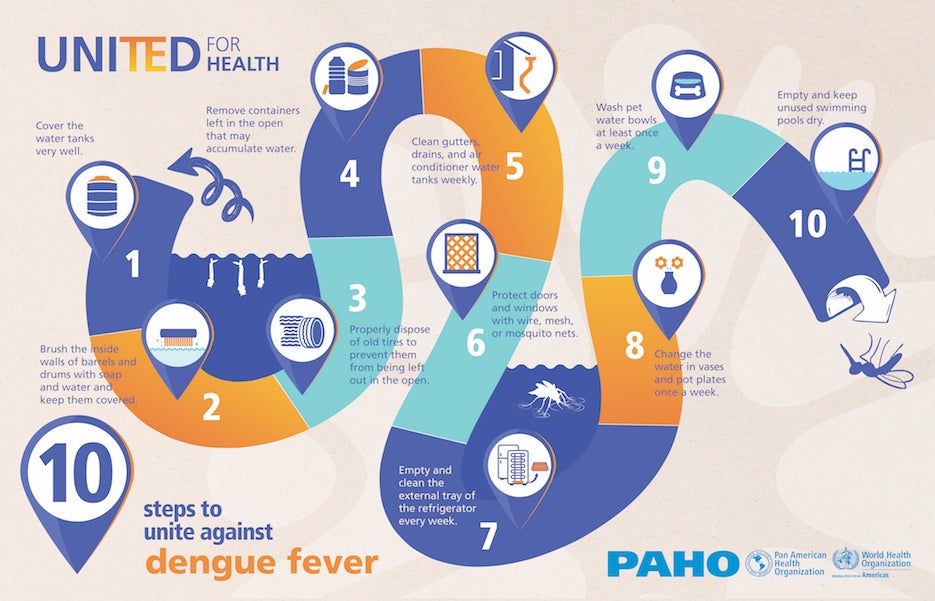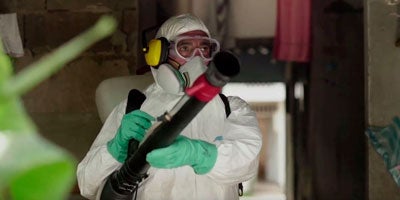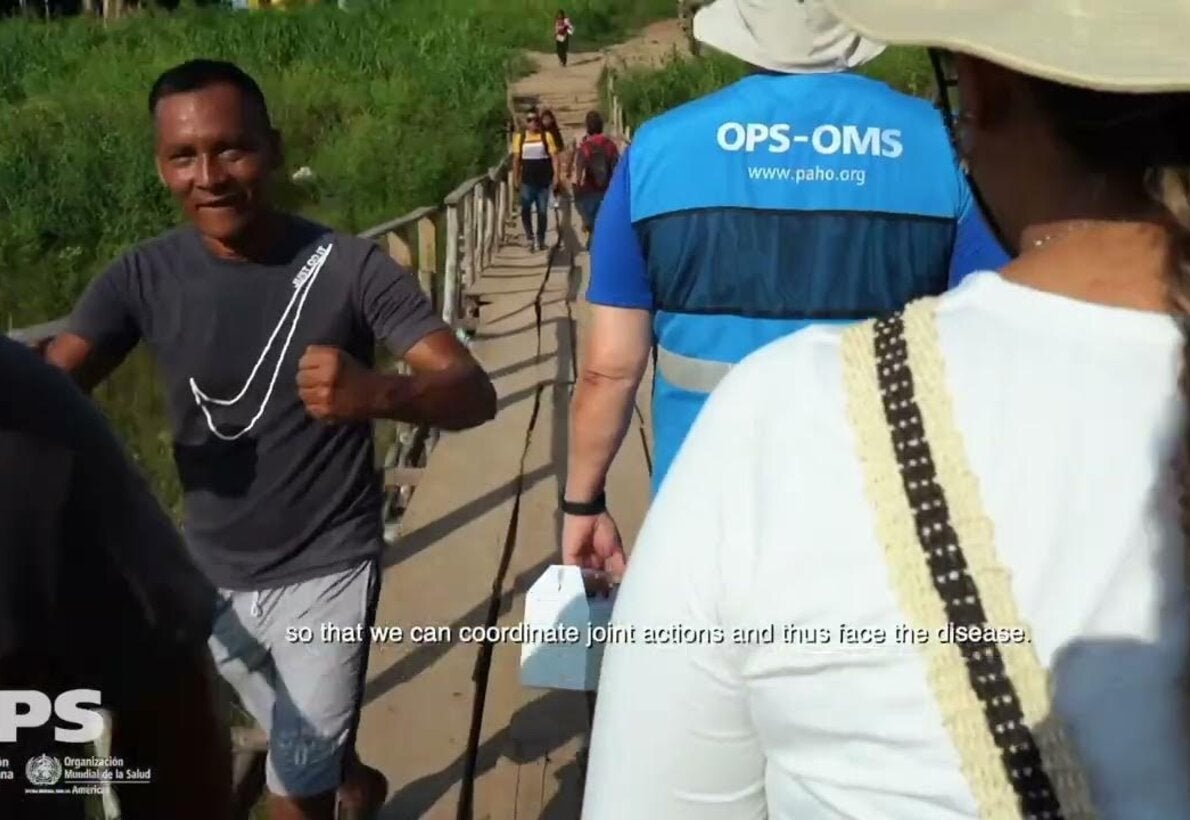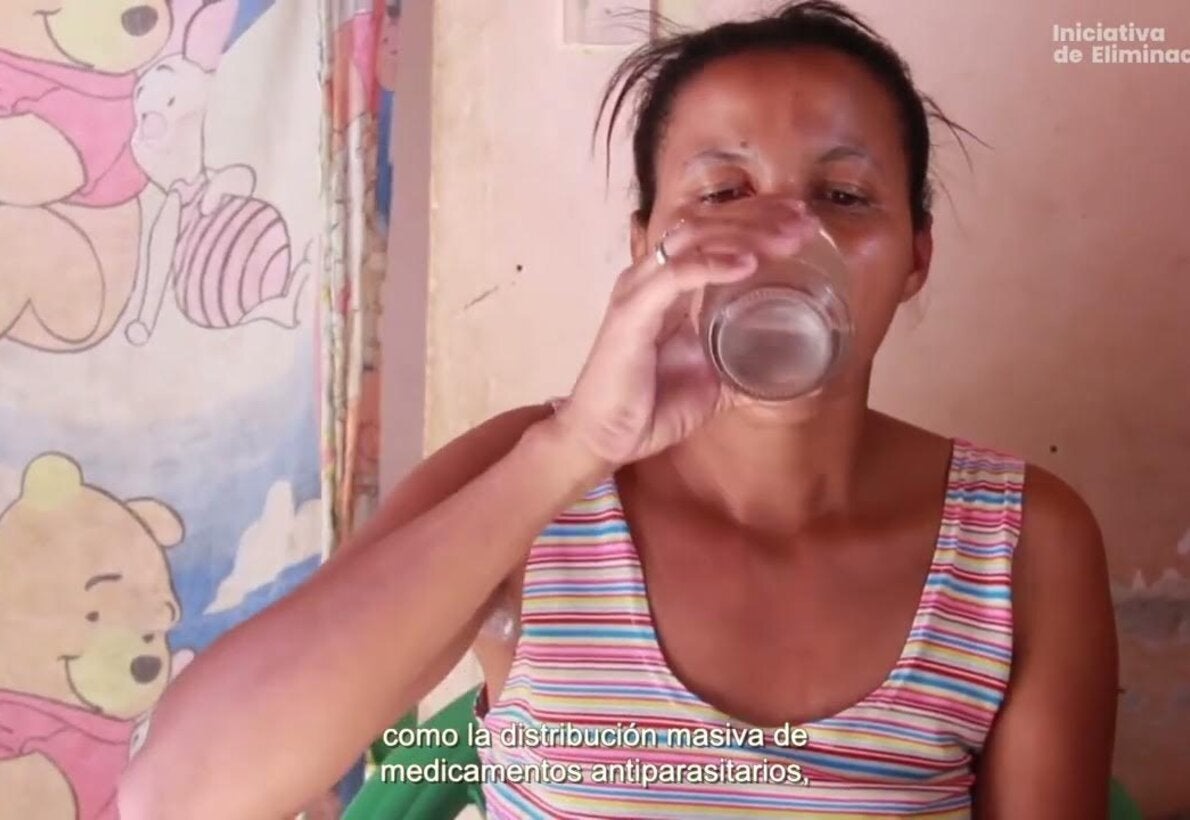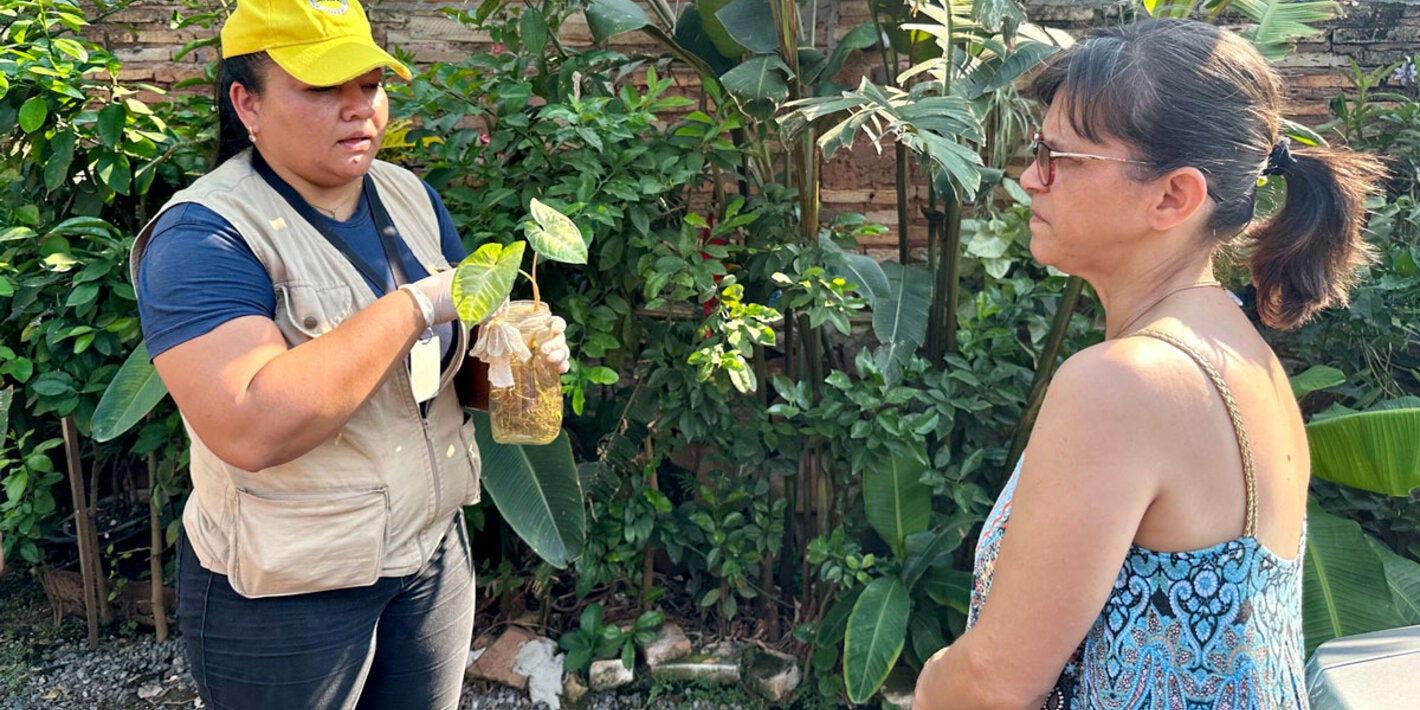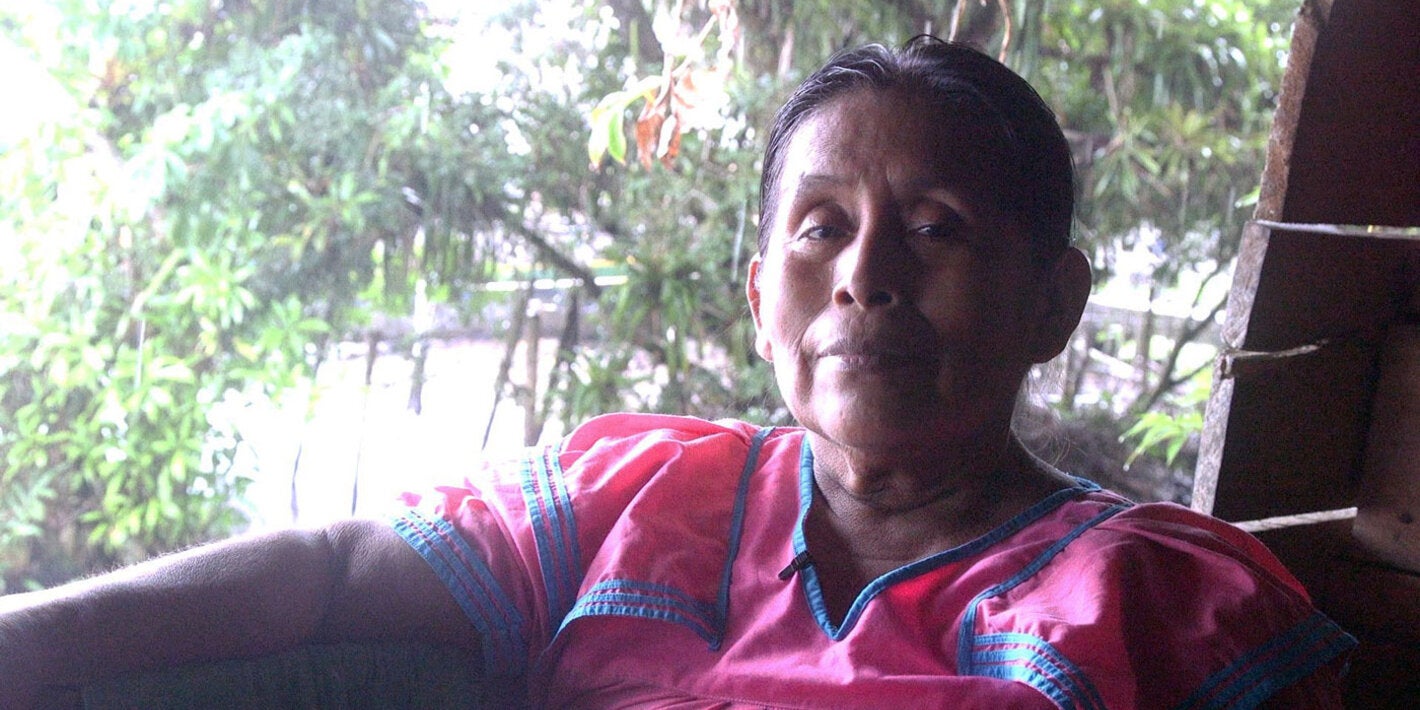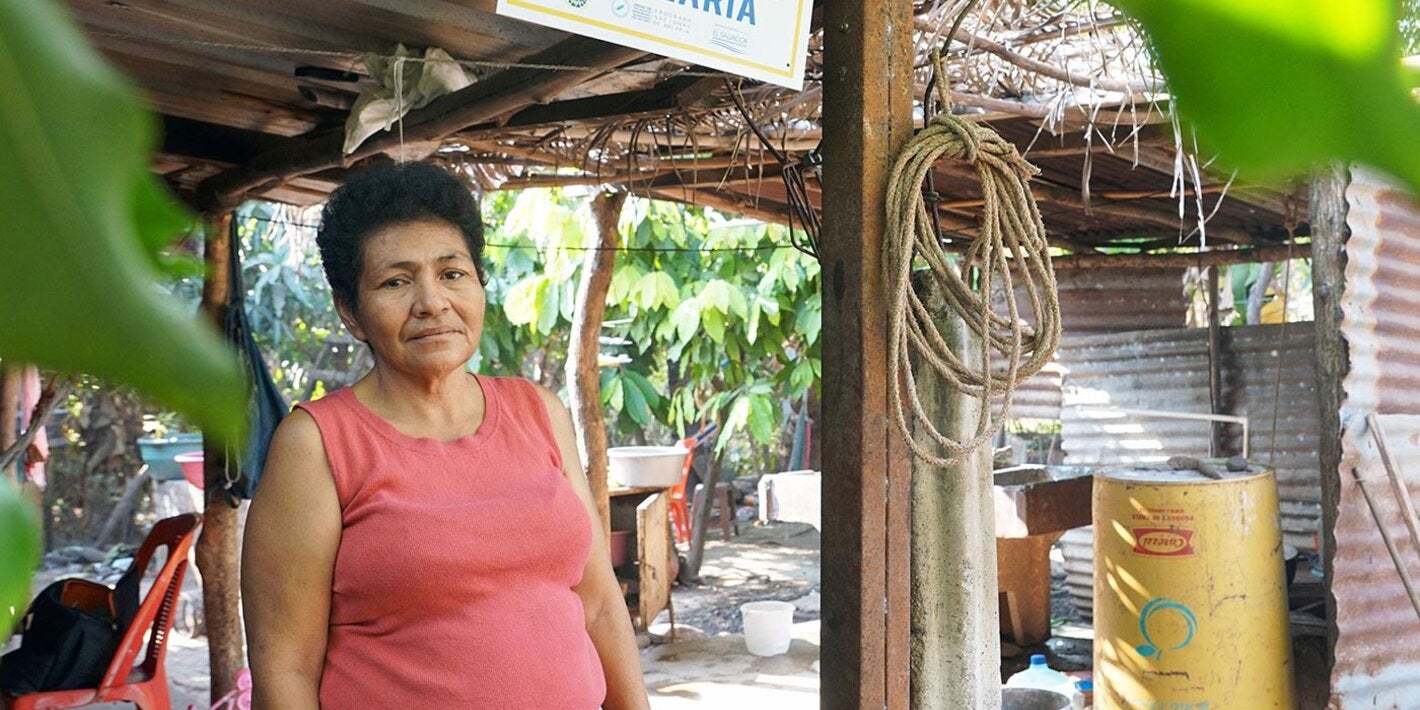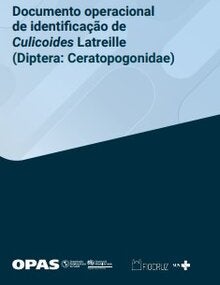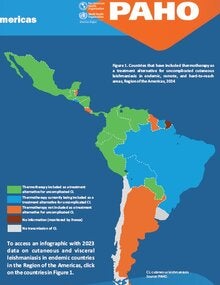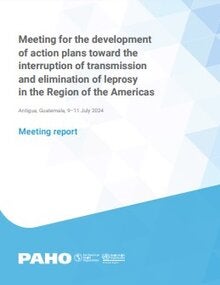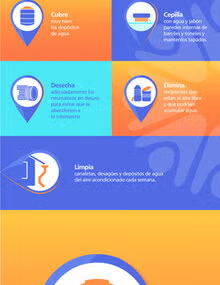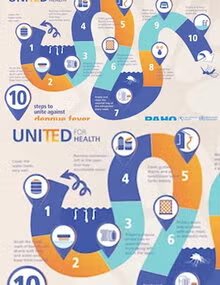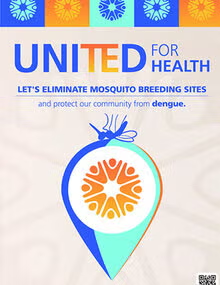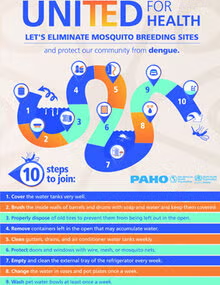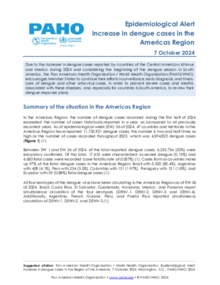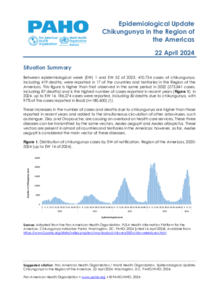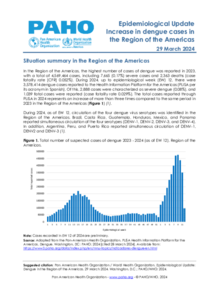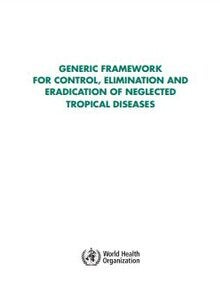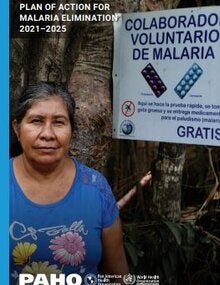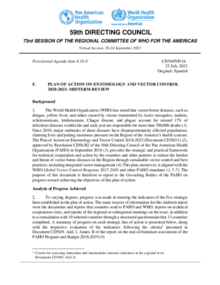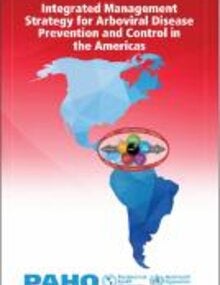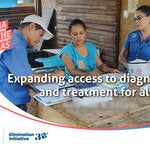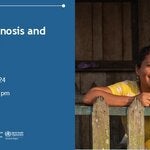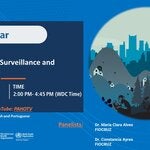SUBMENU
Vector-borne diseases of public health importance are those infectious diseases spread by some organisms, such as insects and snails, which carry viruses, parasites and bacteria to humans. These diseases cause a high burden of illness and death for individuals, their families and communities, as well as high health costs and burdens of countries' health systems.
In recent years, in the region of the Americas, with the appearance of new arboviruses such as those transmitted by Zika and chikungunya, in addition to those already are endemic such as dengue fever and yellow fever, represent a challenge for the health systems, since requires the improvement of clinical and laboratory diagnosis, epidemiological surveillance, and control of mosquito populations to prevent the transmission of diseases, and avoid serious consequences in the population.
Chagas disease is a parasitic, systemic, and chronic disease caused by the protozoan Trypanosoma cruzi, with risk factors strongly linked to low socioeconomic factors. Chagas disease is considered a neglected tropical disease. It is endemic in 21 countries in the Americas, although the migration of infected people can transport the disease to non-endemic countries of America and the world.
Trypanosoma cruzi parasites are mainly transmitted to human by the infected feces of blood-sucking triatomine bugs, known as the "kissing bug". Trypanosoma cruzi can infect several species of the triatomine bug, the majority of which are found in the Americas.
Transmission
A person becomes exposed when the infected insect deposits its feces in the person's skin when he or she is sleeping during the night. The person will scratch the infected area, unintentionally introducing the insect's feces in the wounds of the skin, the eyes, or the mouth.
Other modes of transmission are through blood transfusion, congenital, and organ transplants.
Statistics
With an annual incidence of 28,000 cases in the region of the Americas, Chagas disease affects approximately 6 to 8 million people and causes on average, about 12,000 deaths per year. Although mortality has significantly declined, the disease can cause irreversible and chronic consequences on the heart, digestive system, and nervous system. An estimated 65 million people in the Americas live in areas of exposure and are at risk of contracting this disease. Read More.
Chikungunya is a viral disease transmitted by the bite of infected mosquitoes such as Aedes aegypti and Aedes albopictus.
Symptoms
It can cause high fever, joint and muscle pain, and headache. Chikungunya does not often result in death, but the joint pain may last for months or years and may become a cause of chronic pain and disability.
Treatment
There is no specific treatment for this infection, nor any vaccine to prevent it. Pending the development of a new vaccine, the only effective means of prevention is to protect individuals against mosquito bites.
Dengue remains a public health problem in the Americas despite the efforts of the Member States to stop and mitigate the impact of epidemics. It is a dynamic systemic infectious disease.
Symptoms
The infection can be asymptomatic or show with a broad clinical spectrum that includes serious and non-serious ways of expression. After incubation, the disease begins abruptly and goes through three phases: The febrile, critical, and recovery stage.
Leishmaniasis is a vector-borne disease with a variety of parasite species, reservoirs, and vectors involved in the route of transmission. Leishmaniasis is caused by the protozoa Leishmania, which are spread by a variety of sand fly species.
Three different clinical manifestations of Leishmaniasis
- Cutaneous (skin)
- Mucosal (mucus-membrane)
- Visceral (the most severe form, which affects internal organs)
The presence of Leishmaniasis is directly linked to poverty, but social, environmental and weather factors directly influence the disease's epidemiology. Leishmaniasis is classified as a Neglected Tropical Disease (NTD) and endemic in 98 countries and territories, with more than 350 million people at risk.
"Bancroftian" filariasis due to Wuchereria bancrofti is the only type of lymphatic filariasis present in the Americas. The infection is transmitted by infected mosquitoes.
Symtoms
Is associated with acute and chronic symptoms that can lead to disfigurement and consequently to social exclusion and stigma.
Actual situation and treatment
Measures are being taken to eliminate lymphatic filariasis as a public health problem from the Americas. The mainstay of the strategy is mass drug administration of two anthelminthic drugs: Diethylcarbamazine citrate and Albendazole (Albenza), to all individuals living in endemic areas.
Malaria is a disease caused by the parasite Plasmodium, which is transmitted by the bite of an infected mosquito. Only the Anopheles genus of the mosquito can transmit Malaria.
Symptoms
Include fever, vomiting, and/or headache. A characteristic malarial fever has 'hot', 'wet', and 'cold' phases and appears 10 to 15 days after the mosquito bites.
Onchocerciasis is a parasitic disease caused by the filarial nematode worm Onchocerca volvulus. It is transmitted to humans by black flies (genus Simulium) The disease is commonly known as "river blindness" because the larvae of the blackfly vectors breed in fast-flowing rivers.
Symptoms
It can cause severe skin and eye disease, including blindness.
Actual situation and treatment
Onchocerciasis is endemic in Africa, and in 13 foci in six countries of the Americas (Brazil, Colombia, Mexico, Guatemala, Ecuador, and Venezuela), where it was introduced through the slave trade. The transmission has been interrupted or eliminated in 11 of 13 foci of the Americas. As a result of a regional initiative, only about 20,495 people are still in need of continual treatment in Brazil and Venezuela (Yanomami indigenous population). Furthermore, Colombia is the first country in the world to achieve the verification of Onchocerciasis elimination.
Plague is a zoonotic disease that circulates mainly between rodents and other small animals, in areas of natural foci in various parts of the world. In the Americas, there are foci in 5 countries (Bolivia, Brazil, Ecuador, the United States, and Peru).
The etiological agent, the bacteria Yersinia pestis can also infect humans and this disease can be very severe and of epidemic potential.
Transmission
The most frequent transmission between animals and humans is through the bites of infected fleas. Other forms of transmission can be through direct or indirect contact with animals. It can also be transmitted by inhalation of aerosolized droplets from one infected person to another.
Symptoms
There are different clinical manifestations of plague in humans, pneumonia is the most serious with high lethality and mandatory notification under the International Health Regulations.
Treatment
Plague can be treated with antibiotics, and it is very important to recognize the disease early. Read more
Schistosomiasis is a chronic parasitic infection caused by worms. It is most common in rural and impoverished populations. In the Americas, the parasite species is Schistosoma mansoni, which is associated with intestinal schistosomiasis.
Transmission
The main risk factor for infection is exposure through the household, work, or recreational activities in freshwater contaminated with feces from infected humans. In the Region, for transmission to occur, Biomphalaria snails, the intermediate hosts of the parasite, must also be present in contaminated water. Children and adolescents are the populations most at risk.
Symptoms
Chronic infection can result in anemia, liver and intestinal fibrosis, spleen enlargement, and in serious cases, neurologic complications and death. Schistosomiasis claims the lives of children and adults in the Americas each year.
West Nile virus is a member of the flavivirus genus and belongs to the Japanese encephalitis antigenic complex of the family Flaviviridae. It is transmitted by infected mosquitoes between and among humans and animals, including birds, which are the virus's reservoir host.
First isolated in the West Nile district of Uganda in 1937, WNV is today found commonly in Africa, Europe, the Middle East, North America, and West Asia. In 1999 a WNV circulating in Israel and Tunisia was imported into New York producing a large outbreak that spread across the United States and eventually across the Americas, from Canada to Venezuela. WNV outbreak sites are found along major bird migratory routes. Read more
Yellow fever is an acute viral hemorrhagic disease that is endemic in tropical areas of Africa and Latin America. Cases can be difficult to distinguish from other viral hemorrhagic fevers such as arenavirus, hantavirus or dengue.
Symptoms
Usually appear 3 to 6 days after the bite of an infected mosquito. In the initial phase, they include fever, muscle pain, headache, shivers, loss of appetite, and nausea or vomiting. For most patients, these symptoms disappear after 3 to 4 days. However, 15% of patients enter a second, more toxic phase within 24 hours of the initial remission when high fever returns, and several body systems are affected, including the kidneys.
Treatment
Treatment is symptomatic, aimed at reducing symptoms for the comfort of the patient; vaccination is the most important preventive measure against yellow fever, is safe, affordable and highly effective, providing effective immunity within 30 days for 99% of those vaccinated. A single dose is sufficient to confer sustained immunity and life-long protection, with no need for a booster.
Zika is a disease contracted through the bite of an infected mosquito. When a mosquito feeds on the blood of an infected person and then bites others, it passes Zika to them. There is documentation that the infection can also be passed from mother to child, sexually, and through blood transfusions.
Aedes aegypti is the mosquito that carries Zika, as well as dengue, chikungunya and yellow fever. This mosquito lives in and around dwellings and reproduces in any receptacle that contains water.
There are reports of an association between Zika virus infection, Guillain-Barré syndrome and microcephaly.
With the objective of strengthening regional and national capacity for prevention and control of key vectors, PAHO/WHO has been implementing the “Plan of Action on Entomology and Vector Control 2018-2023” in order to contribute to the reduction of the spread of vector-borne diseases. The activities of the Action Plan are intended to support the strategic lines of action to achieve compliance with the goals, milestones, and objectives of the “Global response for vector control 2017-2030”:
- Multilevel Integration Dimension
- Strengthen interprogrammatic, intrasectoral and intersectoral action and collaboration in vector prevention and control
- Government and community
- Engage and mobilize regional and local governments and communities, including local health services, for sustainable commitments to entomology and vector prevention and control
- Vector Control Programs and Systems
- Enhance entomological surveillance and vector control monitoring and evaluation, including insecticide resistance monitoring and management
- Tools and interventions
- Test, document and integrate proven and/or novel tools and approaches and scale them on a larger scale when possible and/or necessary
- Workforce and Training
- Create and expand the opportunities for entomologists, entomology technicians and public health workers to receive regular training, continuing education and career development


